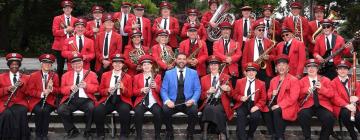Concerts full of 20th-century music are not always appealing to audiences. And when concerts are unappealing, they risk being unappreciated, if not avoided. Similarly, if recital spaces as modest as local churches seem unappealing to world-class performers, then such performers might shun performing in them. Such recoiling is dangerous. It can threaten the very existence of concerts.
Programs that avert this danger are important, brave, and refreshing. An example of such a program happened Friday at St. Joseph's Cathedral Basilica in San Jose, given by soprano Lucy Shelton, pianist Stephen Gosling, and violinist Cynthia Mei — musicians of the highest caliber. Rather than recoiling, though, the trio genially performed in the basilica. Even though their concert was devoted exclusively to compositions of the 20th century, their audience still warmly embraced it. The sheer fact that neither the musicians nor the audience avoided this program, though, only partly explains its effectiveness.
As a performance space, St. Joseph's itself demanded some fortitude from performers and audience alike. At least for sunshine-spoiled Californians, Friday was a chilly night, one that made the old, open church downright cold. Its acoustics were as bleak as the weather. Live and resonant, the church muddied subtleties in the performance. Then, too, the boomy basilica amplified every chair creak and page turn coming from the audience, without sufficiently dampening the sirens, engine sounds, and other noises coming from the street.
Despite all this, St. Joseph's still housed a concert given by highly skilled artists, all of whom specialize in contemporary music. The program also featured a preconcert talk and a postconcert reception. Regardless of the space, no program format could have done greater justice to this music.
Reflective Song Cycles
The program included two sizable song cycles that are secure footholds in the 20th-century song repertory: George Crumb's
Apparition – Elegiac Songs and Vocalises, and Olivier Messiaen's
Poèmes pour Mi. Walt Whitman's magisterial elegy for Abraham Lincoln, "When Lilacs Last in the Dooryard Bloom'd," provides the text for Crumb's piece. Messiaen's is a setting of nine mystical poems that were penned by the composer himself. These two song cycles are similar insofar as they both evoke reflective, spiritual states.
Shelton's voice, strong yet supple, can similarly evoke the ethereal. Her voice was perfectly suited for these pieces. As for the piano, Crumb's work requires playing inside the instrument, and Gosling was equally at ease on the strings as he was on the keys. He also made Messiaen's complex rhythms sound simple to perform.
The program also included two shorter, lesser-known works, which opened and closed the program's first half. The first was an arrangement of a vocal étude. The original, by Thomas Morley, dates from the late 16th century. Charles Wuorinen arranged it in 1994. The contemporary version sounds more like a piano exercise than a vocal one, but Gosling did not break a sweat. Over the complex piano part, the vocalist sings the alphabet multiple times. Shelton and Gosling dramatized the humorous contrast between the charming vocal part and the weighty piano one. It was a capricious opening.
Closing the first half was
Suite for Voice and Violin by the Brazilian composer Heitor Villa-Lobos. Its three movements are full of fun gestures, which Shelton and Mei visibly enjoyed. For example, when Shelton obligingly held Mei's bow so Mei herself could strum her violin like a guitar, Mei did not repress her gleeful smile.
Of course, all the pieces proved that Shelton, Gosling, and Mei take 20th-century music seriously. It was particularly through these two shorter, whimsical pieces, though, that the trio proved its members do not take themselves too seriously.
Despite everyone's cold hands and the basilica's noisy ricochets, this recital was a success story for contemporary music. Unpretentious yet professional, and friendly even if unfamiliar, recitals like this one are precisely what contemporary music needs to ensure its continued existence in public concert life. To be sure, in the hands of Shelton, Gosling, and Mei, live performances of contemporary music continue not merely to exist, but to thrive.
